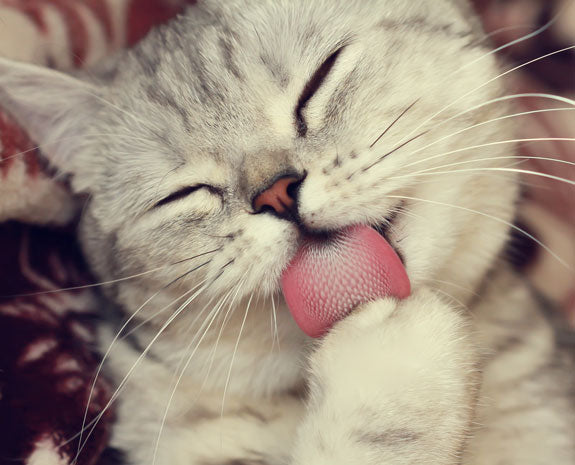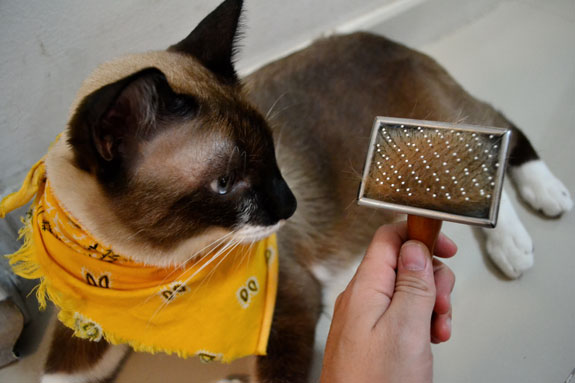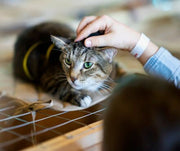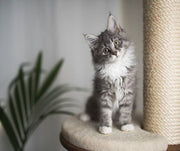Why Cats Get Hairballs

Cats can be some of the cleanest animals, due to their efficient self-grooming nature. But at times, this helpful habit has its downsides. Yes, we're talking about the notorious hairball.
In this feature, we will discuss why cats get hairballs and other matters that you as a cat owner should be aware of when dealing with these inconvenient messes.
Let's get right into it!
WHAT ARE HAIRBALLS?
Hairballs are a natural result of cats grooming themselves. There is even is day called National Hairball Awareness Day! (It's on the last Friday of April if you're interested or curious, so mark those calendars!)
Friendly note: proceed with caution if you're eating!
Unfortunately, hairballs are best described as slimy lumps of hair vomited by your cat with a bile-like substance. They usually take the form of a thin, long strand of saliva that passes through your cat's esophagus, creating a slender cylindrical shape. One regurgitated, hairball size can vary, usually ranging from one to five inches. Hairballs emit an unpleasant but relatively tolerable odor.
Yep. We know. Imagine seeing the dump on your favorite rug! Luckily, they can easily be wiped up with paper towels. If a stain is left behind, you can usually remove them with any standard pet-stain removal carpet cleaner.
Hairballs are the result of domestic cats grooming themselves 30% – 50% each day. They should generally not alarm you unless matters get out of hand.
HOW DO CATS GET HAIRBALLS?

Generally, cats clean themselves with their tongue, which has hard little spines called "papillae." This is why our cat's tongue feels like sandpaper every time they lick us. These spines are made of keratin, just like the ones found on human fingernails.
The reason why cats love to lick themselves clean is because this process helps them detangle fur, remove dirt, dander, and debris accumulated on their coat.
Whenever a cat grooms itself for an extended amount of time, a considerable amount of hair and fur accidentally gets ingested. While a normally small amount of hair is manageable, bunches of hair accumulated over time can spell trouble for your cats. Once it mixes with your cat's food, it can cause blockage in your cat's digestive system.
If your cat has long hair, then their chances of getting hairballs are higher than those of breeds with shorter hair. However, any cat with hair will usually suffer from hairballs a few times in their life.
When cats cannot expel ingested hair through feces, hairballs accumulate either in their esophagus of the stomach. This then leads to a cat's reflex of gagging and vomiting up hairballs. After a period of time, your cat should vomit up the substance.
WHEN SHOULD I WORRY ABOUT HAIRBALLS?
We've established that hairballs are normal and nothing to be concerned about as long as it is dealt with promptly. However, it can be problematic when episodes tend to occur on a fairly regular basis.
Luckily, hairball symptoms are quite obvious, so you'll likely notice if things start to seem unusual. Some signs can be as plain as reoccurring gagging, loss of appetite, and a continuous cough. Other symptoms you want to look out for is your cat continuously bending over and hacking or retching. You can expect a fair amount of slime of your floor or carpet, as it can go on for quite a few seconds.
However, some symptoms indicate severe cases, such as an intestinal obstruction. This can include serious symptoms such as recurring vomiting and diarrhea. For such cases, your best option is immediate veterinary consultation and intervention.
HOW CAN I PREVENT HAIRBALLS?
For the much more serious cases, a visit to your trusted licensed professional is always the best option. For more basic instances, such as whenever your cat is able to throw up a hairball or two on his own, some simple tips to help prevent hairballs are recommended.
Proper grooming and brushing are and always will be at the top of the list. You'd be surprised how much hair is removed with just one grooming session!

Just because our cats groom themselves naturally doesn't mean we shouldn't step in every now and then! It's always a good idea to brush your cat's hair daily, particularly during molting season, so as to prevent dead hair from accumulating on your cat's coat.
Another factor you need to consider is your cat's diet. Switching to wet food, changing your cat's food, or avoiding processed selections and picking healthier options can be an effective way to lessen the chances of hairballs. Be mindful though. Just like with any other change, always consult your veterinarian to confirm just how to and what type of food to introduce to your cat.
Lastly, resort to a veterinarian-approved medication if deemed necessary.
THE WRAP UP
We all love our cats, and we do everything we can to make their quality of life even better. We hope this feature helped you out in dealing with hairballs, and while these remedies don't apply to every scenario, they tend to do just the trick. Just remember to brush your cat regularly, feed them right, and you, your cat (and your favorite rug), should be just fine!
Sources:
- https://www.petmd.com/cat/grooming/evr_ct_cat_hairballs
- https://www.hillspet.com/cat-care/healthcare/why-hairballs-in-cats
- https://www.vet.cornell.edu/departments-centers-and-institutes/cornell-feline-health-center/health-information/feline-health-topics/danger-hairballs
- https://www.animalbiome.com/blog/your-cat-has-hairballs-should-you-worry
- https://www.aspcapetinsurance.com/resources/minimizing-hairballs-in-cats/
Previous article

Next article

Related posts
View all-

Keep Your Pets Safe During the Holidays
The holiday season brings joy, festivities, and a break from the usual routine. While you're enjoying the celebrations, it's important to remember that the holidays can present unique challenges for our furry family members. The new sights, sounds, and people can be overwhelming, and common festive items can pose unexpected risks.
Read Article -

Holiday Gifts for Every Pet Personality: The Ultimate Guide
The holiday season is finally here, and for many of us, that means finding the perfect presents for the ones we love most—our pets. Whether they are a steadfast dog who never leaves your side or an independent cat who graces you with their presence on their own terms, our pets are cherished members of the family. They deserve to celebrate right alongside us, stocking stuffers and all.
Read Article -

How to Keep Your Pet Calm During Thanksgiving
Thanksgiving is a time for family, friends, and food, but for our pets, the holiday can be overwhelming. The sudden change in routine, unfamiliar faces and scents, and increased noise can trigger significant stress. Understanding why your pet might feel anxious is the first step toward creating a peaceful holiday experience for everyone, including your furry family members. This guide offers calming tips for pets and practical solutions to ensure your dog or cat feels safe and secure during the festivities.
Read Article



